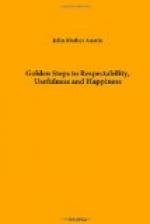“But though the minds of men are sometimes fatally infected with this disease, either through unhappy prepossession, or some of the other causes above-mentioned, yet I am unwilling to believe that there is in nature so monstrously incongruous a being as a female infidel. The least reflection on the temper, the character, and the education of women, makes the mind revolt with horror from an idea so improbable and so unnatural.
“May I be allowed to observe that, in general, the minds of girls seem more aptly prepared in their early youth for the reception of serious impressions than those of the other sex, and that their less exposed situations in more advanced life qualify them better for the preservation of them! The daughters (of good parents I mean) are often more carefully instructed in their religious duties than the sons, and this from a variety of causes. They are not so soon sent from under the paternal eye into the bustle of the world, and so early exposed to the contagion of bad example: their hearts are naturally more flexible, soft, and liable to any kind of impression the forming hand may stamp on them; and, lastly, as they do not receive the same classical education with boys, their feeble minds are not obliged at once to receive and separate the precepts of Christianity, and the documents of pagan philosophy. The necessity of doing this perhaps somewhat weakens the serious impressions of young men, at least till the understanding is formed; and confuses their ideas of piety, by mixing them with so much heterogeneous matter. They only casually read, or hear read, the Scriptures of truth, while they are obliged to learn by heart, construe, and repeat, the poetical fables of the less than human gods of the ancients. And, as the excellent author of ’The Internal Evidence of the Christian Religion’ observes, ’Nothing has so much contributed to corrupt the true spirit of the Christian institution, as that partiality which we contract, in our earliest education, for the manners of pagan antiquity.’
“Girls, therefore, who do not contract this early partiality, ought to have a clearer notion of their religious duties: they are not obliged, at an age when the judgment is so weak, to distinguish between the doctrines of Zeno, of Epicurus, and of Christ; and to embarrass their minds with the various morals, which were taught in the Porch, in the Academy, and on the Mount.
“It is presumed that these remarks cannot possibly be so misunderstood, as to be construed into the least disrespect to literature, or a want of the highest reverence for a learned education, the basis of all elegant knowledge: they are only intended, with all proper deference, to point out to young women that, however inferior their advantages of acquiring a knowledge of the belles-lettres are to those of the other sex, yet it depends on themselves not to be surpassed in this most important of all studies, for which their abilities are equal, and their opportunities perhaps greater.




